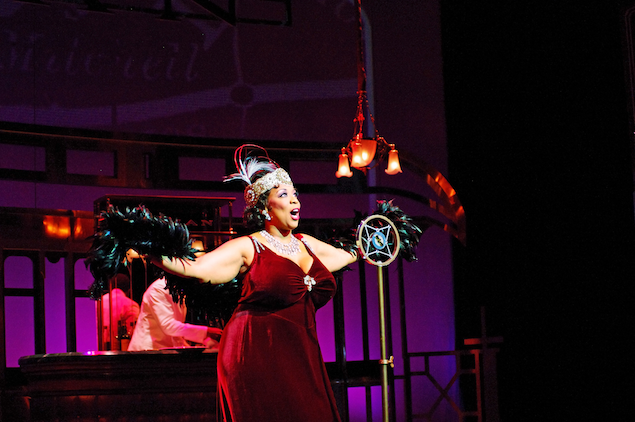
She’s brassy. She’s bossy. She’s . . . most likely drunk. And she “don’t take sh*t
from nobody!” (She also freely confesses that she uses profanities like some people
use punctuation.)
The “she” is Sister Juba, and while Arena Stage’s
Pullman Porter Blues is ostensibly about three generations of black porters who worked on high-class trains
in the Depression era, it’s impossible to tear your eyes away from
E. Faye Butler’s performance as the inebriated blues singer. Butler is fearless and fascinating
as Juba, a character who provides plenty of comedy with her antics and can bring down
the house with her singing—but is also a vulnerable, complicated woman who’s been
through hell to get to where she is. She also has a storied history with the Sykes
men, the family of porters at the center of the play.
Praise for Butler should take nothing away from the performances of those men—Arena’s
production, a world premiere by Cheryl West produced in concert with Seattle Repertory
Theatre, is bursting with talent. There’s Monroe (Larry Marshall), the oldest of the servicemen, who smiles and nods his way through his work, bringing
a quiet dignity to his job while managing to steer clear of the wrath of a shady,
opportunistic white train conductor (Richard Ziman). Taking the opposite approach is his son Sylvester (Cleavant Derricks), a fiery union organizer who fights injustice wherever he sees it, but who is also
struggling with guilt from his past. Sylvester is dead set against the fact that his
son Cephas (Warner Miller), with the help of Monroe, has found himself a summer gig on the Pullman train. But
Cephas is chafing at the future his father has mapped out for him as a doctor, and
wants to see the world.
Pullman Porter Blues is a play with music, and director Lisa Peterson moves along the proceedings with
fine Midwestern numbers such as “Sweet Home Chicago” and “New Orleans Hop Scop Blues.”
The atmospheric songs showcase the formidable musical theater chops of all the players.
Marshall is a graceful dancer with an arresting voice, while Derricks’s rich, powerful
singing is on full display in the tortured “Grievin’ Hearted Blues.” The songs feel
like an organic part of the action, as Sister Juba’s backup band is stationed in one
of the train cars, and the band becomes an important plot point when Cephas stumbles
on a harmonica-playing stowaway, Lutie Duggernut (Emily Chisholm), who challenges his preconceptions.
Pullman Porter Blues is important as a slice of lesser-known history, but it also feels refreshingly contemporary.
Cephas’s soul-searching has an air of entitlement to it (he really doesn’t understand
what his father and grandfather sacrificed to get him an education) that feels distinctly
millennial. Conductor Tex’s muddled railings against FDR feel similar to the frustrations
that economically troubled middle class attribute to the current President.
Riccardo Hernandez’s flexible set pieces makes action flow smoothly from train car to train car.
The story ends on an ambiguous note, and it’s a choice that works. The fate of the
family is uncertain, but West accomplishes two things: She dignifies the struggle
they’ve faced up to this point, while still making it clear a tough road is ahead
for these three strong, complicated men.
Pullman Porter Blues
runs through January 6 at Arena Stage. Running time is about two and a half hours,
including one intermission. Tickets ($45 to $94) are available via Arena Stage’s website.

















